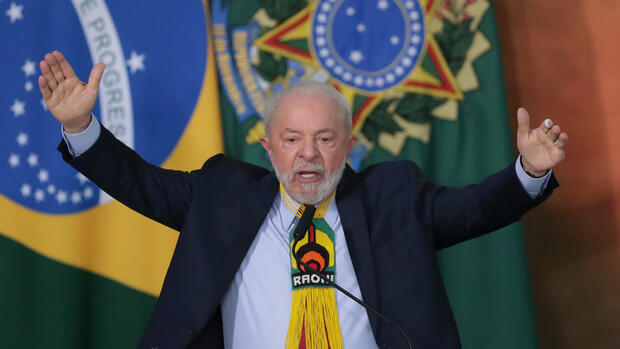Salvador In recent weeks, there has been something of a reversal in sentiment in Brazil’s economy: in early June, the Bureau of Statistics reported first-quarter growth of four percent, almost double what most investment banks had been expecting. Above all, agriculture contributed to this.
Brazil has suddenly become the fourth fastest growing economy in the world, reports Austin Rating agency. Investment banks such as Goldman Sachs increased their growth forecast for 2023 from 1.9 percent to 2.6 percent. Economists expect trade surpluses, Brazil’s debt ratio could soon shrink.
European Commission President Ursula von der Leyen met Lula on Monday and said afterwards that she hopes to conclude the planned trade agreement with the South American economic community Mercosur by the end of the year.
But analysts are currently reluctant to make long-term forecasts for Brazil. Because the good mood on the financial markets continues to contrast with the skepticism with which entrepreneurs view the Lula government.
Government plans nationalization
From their point of view, the former labor leader is actually doing almost everything wrong. Because the president’s main ambition is to roll back all the economic reforms of his right-wing populist predecessor Jair Bolsonaro. Lula constantly attacks the interest rate policy of the autonomous central bank, which he would like to bring back under government control.
>> Read here: Entrepreneurs withdraw confidence from Bolsonaro
In the successfully reformed water management system, he wants to allow state monopolies back, which has meant that almost 100 million of Brazil’s 214 million people are not connected to a sewage system. In doing so, he threatens to choke off the private suppliers’ investment boom that has just begun.
Lula also wants to regain state control of the energy holding Eletrobras with the help of the Constitutional Court. The publicly traded, but state-owned oil company Petrobras is to be kept on the tight leash of the government again: the state is to set petrol prices “flexibly”.
Under previous Left Party governments, the company has made losses for years because, at the behest of Brasilia, it has had to sell fuel below production costs in order to spur growth and keep inflation down. Now the group is to become Brazil’s industrial tractor again.
Petrobras is a Brazilian semi-public oil company based in Rio de Janeiro.
(Photo: Reuters)
The national development bank BNDES will again determine “growth sectors” in which companies should receive subsidized loans.
Concepts from 20 years ago
The same state development policy that has already failed would be repeated, says Arminio Fraga, former central bank president and fund manager. The government will now subsidize the purchase of small cars. But that doesn’t help Brazil’s poor—as Lula justifies the measure—nor the country’s carbon footprint. But Lula hopes for jobs and income in the auto industry.
Economist Samuel Pessoa criticizes that the government is once again attempting an industrial policy that hasn’t worked and, starting in 2013, led to the biggest crisis in the Brazilian economy.
In the governments of Lula and his successor, Dilma Rousseff, a gigantic network of corruption had grown around the state-owned company Petrobras and the country’s private construction companies. Its destruction led to a multi-year recession from which the country has not recovered to this day.
Lula’s environmental and Amazon protection concept failed in parliament.
(Photo: action press)
In the interests of the entrepreneurs, Lula’s economic policy does not have a majority in parliament. Only a third of MPs are on the President’s side. Arthur Lira, the powerful Speaker of the House of Representatives, has made it clear that Lula will not succeed with his economics course. Ex-President Bolsonaro still has a strong base in Congress, as do the agricultural lobby and the evangelicals.
Brazil’s environmental measures fail in parliament
There, however, not only the state-believing economic program fails, but also Lula’s environmental and Amazon protection concept. The President wants increased surveillance and higher penalties for illegal logging and illegal mining.
That would be important for cooperation with the West and the chances of the EU-Mercosur agreement. If the concept fails, foreign investors will be deterred in the medium term, whose investments in Brazil will be checked for sustainability criteria.
Then the country’s economic data could quickly develop in a different direction. Even the good figures for the first quarter show that investments as a whole and industrial production have fallen. Brazil urgently needs investments in industry if it wants to increase the low productivity of its economy.
Credit Suisse chief economist Solange Srour has calculated that Brazil would have to increase its productivity by 2 percent a year in order to grow more than 2 percent a year. But the Brazilian economy has never managed to do that in the last 40 years. Productivity increased by an average of just 0.8 percent.
Ex-union leader Lula will probably have to be grateful to Brazil’s farmers for the next few months – even though he despises the farmers just as much as they despise him. But agricultural exports could save the economic balance sheet in the first year in office.
More: Lula keeps drifting to the left
